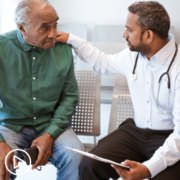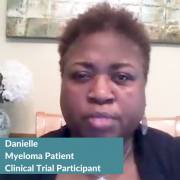How Can Myeloma HCPs Initiate Clinical Trial Conversations?
How Can Myeloma HCPs Initiate Clinical Trial Conversations? from Patient Empowerment Network on Vimeo.
How can myeloma healthcare professionals start clinical trial conversations? Dr. Craig Cole from Karmanos Cancer Institute shares how he initiates conversations with newly diagnosed patients and how myeloma community groups also help patients and families.
Download Resource Guide | Descargar guía de recursos
Related Resources:

|

|

|
Transcript:
Dr. Nicole Rochester:
That’s an amazing success story. Thank you for sharing that. What about you, Dr. Cole, with regard to potential strategies for healthcare providers, what are some things that they can implement for initiating these clinical trial conversations early in the journey, particularly in the current environment?
Dr. Craig Cole:
Yeah. And Ms. Gleason had mentioned this at kind of the top of our talk about having those conversations on day one. On day one of our patients coming in either as a second opinion, as a new diagnosis, as in whatever setting, we talk about…we have a list that we go through with the patient that talks about their stage or the disease, how we’re going to follow up. And there’s a line that I have to address, which is, clinical trials. So I mentioned our clinical trials, I mentioned on day one. And I think one strategy that other healthcare providers can take is that, even if you don’t have a clinical trial at that time, so right at this moment, we don’t have an upfront clinical trial.
We have one for maintenance therapy, post-transplant, but we don’t have an upfront trial. I mention that. I say that there are clinical trials that are available for your myeloma. Right now we don’t have a clinical trial for upfront myeloma, but we can refer you for a second opinion for an upfront trial if you’re interested or…and we have a clinical trial in maintenance.
So that sets the groundwork that we’re going to talk about clinical trials on every visit. And that it doesn’t come as a surprise. Because the last thing you want to do is that someone is having a relapse and you say, “Oh, we’re going to talk about clinical trials today.” Because then it’s like, “Oh my goodness, this is a desperation.” This is a desperation move, and it puts a lot of anxiety when you frame it, and we need to do this now as opposed to having on day one.
The second thing that I think really helps is getting patients involved in the myeloma community, especially with the support groups having not only the patients, but their care providers and families involved in the myeloma community. Because the myeloma communities through a lot of the support agencies like the IMF, the MMRF, the HealthTree, they have a very strong clinical trial culture. And when patients get involved, not only is that empowering to see other myeloma patients doing well, but to hear other myeloma patients talk about their experiences in clinical trials really, really helps. And I think the last thing that we use to help patients, go through clinical trials, is a couple of other things, is one, every time we talk about treatment options, if that is maintenance, if that is smoldering, if that is a relapsed/refractory therapy, we always put clinical trials in that conversation.
Again, even if we don’t have that clinical trial at our institution, we talk about this as an option that we could refer you out to. And, and then we always talk about…I think one other little thing is that every visit that patients have, I somehow include some of the new things that are happening in myeloma. Now, my patients kind of expect it. They expect. They know when December and June is because when I see them after ASH and ASCO and sometimes they’re like asking, “So what’s new?” And once we get into that groove, they see, gosh. There are response rates that are off the charts with some of these new things. These patients are involved in clinical trials and the myeloma and multiple myeloma research is progressing at such a rate and things are getting better that patients want to be involved in it.
So we’re always talking about new things. Do I go into depth of detail with talquetamab (Talvey) and pomalidomide (Pomalyst). I don’t go into depth of detail. And I say, where I was this clinical trials at our last ASH meeting that combined these two drugs for a relapsed/refractory myeloma, even patients who were refractory to some of the drugs you’re on now. And response rate was like 100 percent. And then when I talk about those clinical trials in the future, they’ll remember, man, that guy was talking, he’s all upset about these clinical trials. Maybe I want to be involved in them. So that’s kind of my few strategies that I use.
Dr. Nicole Rochester:
I love that. And what I really hear both of you saying is this idea of normalizing conversations about clinical trials and not introducing them as like a Hail Mary, so to speak, but really from the very beginning, letting patients and care partners know that this is a viable treatment option. So I think that is wonderful. And I can say like, your excitement is contagious for me, so I can only imagine how excited the patients that you work with feel.


![[ACT]IVATED Gastric Cancer Spanish Resource Guide Thrive | Considering CAR T-Cell Therapy for Myeloma? What You Should Know Resource Guide](https://powerfulpatients.org/wp-content/uploads/ACTIVATED-Gastric-Cancer-Spanish-Resource-Guide-1-180x180.png)







